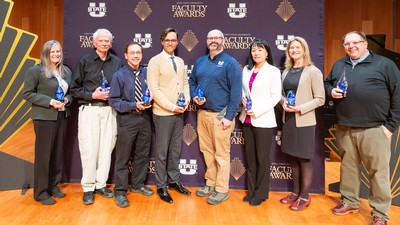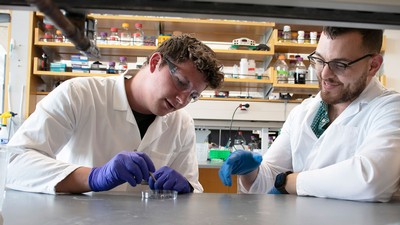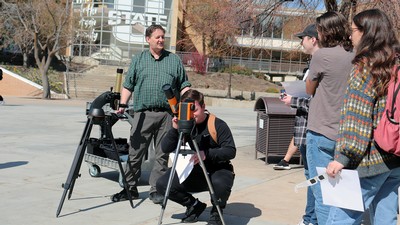USU Student's Research Could End Negative Side Effects in Diabetes
USU-Uintah Basin student Ryker Hacking is working on ending negative side effects in diabetes.
Ryker Hacking, a Vernal native and student at Utah State University, performed vital research in the USU-Uintah Basin summer internship program that could end the negative side effects in diabetes. Hacking presented his research at the twelfth annual Utah Conference of Undergraduate Research on Feb. 9.
In 2015, a Korean research group discovered a molecule known as MBT that is able to inhibit aldose reductase (AR), an enzyme responsible for causing kidney, retina, nervous system and red blood cell damage. However, MBT is only available in extremely small amounts in nature. Under the direction of Mike Christiansen, an associate professor at USU-Uintah Basin, Hacking developed a way to synthesize, or create, MBT in a lab.
“If MBT proves to be a successful and nontoxic means of inhibiting AR in clinical trials, it could serve as an eventual medicine to prevent the negative reactions of diabetes,” said Christiansen. “Once we optimize Ryker’s new method, we can scale up production and begin testing MBT’s viability.”
As an undergraduate student Hacking was able to get invaluable research experience thanks to USU-Uintah Basin’s summer internship program. Christiansen mentored Hacking, showing him how to use the lab equipment and perform experiments, specifically of synthesizing chemicals, which was paramount to Hacking’s research.
“This was an amazing experience that helped me learn things I couldn’t have learned just sitting in a classroom,” said Hacking. “I think the USU-Uintah Basin summer internship programs is one of the most important steps the university has taken to help students grow professionally.”
Christiansen’s research group will further develop and refine the process of making MBT, with the goal of making it available to the public to treat Type 1 and Type 2 diabetes.
Contact: Dana Rhoades, 435-797-1788, dana.rhoades@usu.edu
Ryker Hacking with USU-UB faculty mentor Mike Christiansen.
TOPICS
Research 874stories Statewide Campuses 338stories Health 305stories Nutrition 80stories Internship 47stories Diabetes 13storiesComments and questions regarding this article may be directed to the contact person listed on this page.








